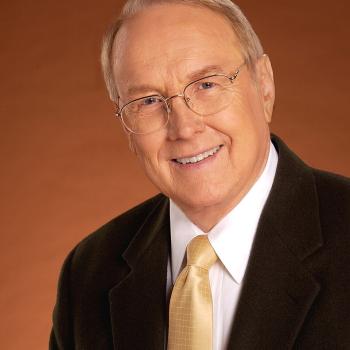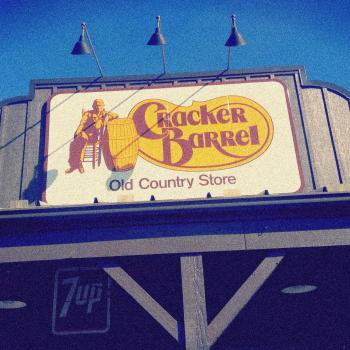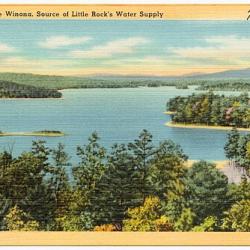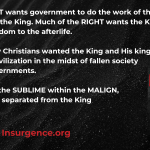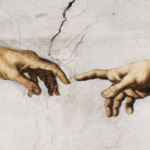Last month, Abram Van Engen contributed a post here at the Anxious Bench on “Os Guinness, Eric Metaxas, and Their Dangerous Mythos of American History.” That post prompted Os Guinness to respond to Abram, which generated a fascinating conversation exploring points of connection and dissonance. Both have graciously agreed to publish this conversation as a follow-up post. Their correspondence reveals both generational and interpretive differences, even as both work to establish common ground.
It’s a longer post than usual, so grab a drink (or two), and listen in.
Dr. Os Guinness
July 27, 2020
My In-box suddenly lit up last week. From all sides I was told that Eric Metaxas and I were being attacked for “dangerous Christian nationalism” in our attempts to defend what George Washington called the “great experiment” in freedom.
I have never met the Christian scholars who leveled the charge, but hope that one day I will. I was puzzled before I read the articles, and even more so afterward. “Christian nationalism” is the academic charge du jour to be leveled against Evangelicals, but it is often vague and lacking in definition – and in this case lacking in evidence. It therefore operates as handy invective for social media put-downs, but is it worthy of scholars, let alone fellow-Christian writers?
Allow me to respond to the accusation with some very brief points as to why it is misdirected. Having spoken and written for fifty years, these points are scattered across many of my books. As I often make clear, I am not a scholar, but I do endeavor to be as careful a thinker as I can.
First, for Christian reasons I have always appreciated George Orwell’s useful distinction between patriotism (positive) and nationalism (negative). Christian nationalism is therefore a form of idolatry and anathema for Christians.
Second, I have always criticized the notion of American “exceptionalism” (and been criticized for my criticism). I consider the idea both untrue and unhelpful.
Third, I have written extensively on the importance of a “civil public square,” but at the same time I have always attacked American “civil religion” as idolatrous and unChristian.
Fourth, I have long argued that the term “Christian America” is misleading and unhelpful, and creates special problems for important groups such as the Jewish people.
Fifth, I believe firmly that the First Amendment and “disestablishment” are at the heart of the genius of American freedom. Any attempt to restore any form of establishment would be quite wrong and a historic blunder.
Sixth, I have repeatedly made clear that when I say the Constitution is “biblical,” I mean that its historical roots are in the Exodus notion of covenant (as Daniel Elazar et al). At the same time, I almost always add “largely biblical” because of course I recognize and often mention the blatant contradiction of the evil and hypocrisy of slavery (which Evangelicals in Europe queried strongly at the time). My Guinness ancestors were solidly in the ranks of the Evangelical reformers, and fought against a myriad of abuses and injustices in Europe, Africa and Asia, including slavery. I would gently challenge the condescension of Americans who tend to see no virtue except that of their own generation.
Seventh, I am not American, so it is odd to be described as a “Christian nationalist” defending America. As my wife could tell you, you only have to play a haunting version of the “The last rose” or “The fields of Athenry” to know which country it is that triggers the deepest yearnings of my heart.
Let me raise one question to those criticizing us. Do they recognize any merit in what Abraham Lincoln called the “better angel” of the American nature? If not, it would be natural to go with the radical left and throw out 1776 altogether, as many leftwing radicals are working hard to do.
But if our critics do recognize a “better angel,” as Lincoln did, how is a defense of that “better angel” any different from what we are seeking to do – which is now dismissed as “Christian nationalism”?
Let me put my position plainly: even with a clear-eyed acknowledgment of America’s flaws and failings, I still believe that America’s vision of (biblically based) “ordered freedom” provides the once and future key to human freedom. That is why I make my stand, not as a “Christian nationalist,” but as a lover of human freedom and justice.
In sum, let the critics define and provide evidence of the “Christian nationalism” that defenders of the American experiment are said to be guilty of.
Many of the things we are accused of have never crossed my mind. “Dangerous nationalists” we are not, but we are open to correction, and we believe that corrigibility is essential for discovering truth and growing in understanding. We expect to receive no quarter when debating with those who are not Christians, and the era of the social media can make this problem truly appalling. But as Christians debating Christians we can surely demonstrate a more excellent way.
Resident Aliens, a Response to Os Guinness
By Abram Van Engen
I want to thank you, Dr. Guinness, for responding to my article. It is good to hear a prominent evangelical agreeing that Christian nationalism is idolatrous and that American exceptionalism is “both untrue and unhelpful.” The crucial factor, however, is how to define such terms, and perhaps our disagreement has something to do with definitions.
American exceptionalism can have many meanings. This is how I understand the term: it is the belief that the United States has been singled out from all other nations in order to lead the way to human freedom. Such a belief can take secular forms, but it usually resounds with religious overtones. While mainly a comparative claim (this country as distinct from all others), American exceptionalism depends above all on historical arguments. It locates an exceptional beginning, and it claims that the present day depends on that unique point of origin. We are the unfolding of principles that arrived at one precise moment. Since that moment is considered an almost-divine revelation, citizens of the United States must further the good of the country not by learning from what other countries have done well, but only by remembering and remaining faithful to their origin. As a result, origin stories become especially important—and especially fraught. Is the American Founding essentially secular or essentially religious? Is it largely classical, largely biblical, or largely something else? Is it mainly righteous or mainly sinful? American exceptionalism locates the cause of any present crisis in a departure from our original principles and determines the direction we must proceed through a return to our beginnings.
Christian nationalism builds on American exceptionalism. It is the belief that our specific model and our mission as a nation cannot succeed unless the Bible and its values remain at the core of American culture—from the moment of the Founding to the present day. Such a view does not entail establishing Christianity as an official religion. Instead, it means that in America (unlike in other countries), we cannot flourish or fulfill our mission unless the predominant ethos and prevailing values of the country are essentially Christian and biblical.
My original critique responded to recent statements from you, Eric Metaxas, and David Barton. To make sure I was not misrepresenting you, I read your book Last Call for Liberty, and I found in that book endorsements of both the positions described above. I would like to look closer at that book, therefore, and explain why I think these views are problematic. Where I get your book wrong, I hope you will correct me. And where you disagree with me, I hope we can carry on a useful dialogue.
Last Call for Liberty invokes biblical references and paradigms as paramount to the founding and function of the country, describing America as an almost-chosen nation. In the introduction, you briefly acknowledge the influence of classical sources on the Founding. The Founders were deeply influenced by democracy in ancient Greece (as you mention) and the example of the Roman republic (which goes unmentioned). But after acknowledging that influence, your book ignores it. By the end of the book, we hear “that 1776 and America’s great experiment in political freedom owed everything to the Hebrew Bible and to the book of Exodus in particular.”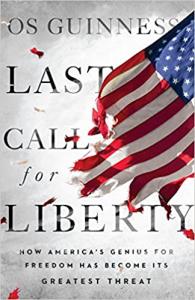
On my reading of your work, this conclusion results from a stark binary between the religious and the secular. America is presented as a land where those who defend true freedom (which you claim depends on faith) must constantly contend with those who threaten it (mainly “Left/liberals” and “secularists”). Last Call for Liberty is a defense of American freedom that requires an abiding fear of many or even most Americans. That seems to be the idea behind a chapter titled, “Are there enough Americans who care about freedom?”
If we believe, contrary to the historical record, that “America’s great experiment in political freedom owed everything to the Hebrew Bible,” then it will not surprise us to discover that the greatest threats to America come from non-Christian sources. The book worries about extremes on both sides, but all its examples draw only from one side. So I’d like to ask an open question: Do evangelicals ever curtail freedom in America or threaten the fundamental values of the country? If so, how? And if not, then I worry that we have dangerously conflated the nation and national values with evangelicalism and evangelical values.
In Last Call for Liberty, readers encounter a familiar, though incorrect story with deep roots in American culture, where the Pilgrims and Puritans pave the way to the nation’s founding. In my book, City on a Hill: A History of American Exceptionalism (and in this online lecture), I explain how and why the Pilgrims and Puritans came to occupy this role in American lore, despite not being the first people here, nor the first Europeans, nor even the first permanent English settlement in America. I also explain how John Winthrop’s 1630 “city on a hill” sermon—which gets used to describe the nation as having originated with an almost divine sense of covenant—was never known in its own day, was not published until 1838, and was not invoked by any president until John F. Kennedy (during a Cold War era that also added the words “under God” to the Pledge of Allegiance). Your use of the Pilgrims, the Puritans, and Winthrop’s sermon all help to create and sustain ahistorical narratives of American exceptionalism—though you are certainly not alone in that endeavor.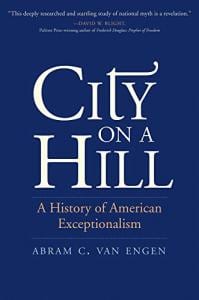
Eighteenth-century New England clergymen were the first to perpetuate these kinds of narratives, and in advancing New England’s interest through religious rhetoric they tried to make the cause of America synonymous with the Kingdom of God. Nathan Hatch and Jonathan den Hartog (both of whom are Christian historians) have explained this process well. “By 1760,” as Hatch writes, “New England clergymen appear to have lost a clear distinction between the kingdom of God and the goals of their own political community.” The loss of that distinction is what worries me about these histories of America.
We do not need to baptize the nation to discuss liberty, justice, and mercy. Take the moment when our country separated immigrant children from their families and fenced them in cages on the border. Would we, as Christians, want to say that this is wrong because it goes against our “American values”—even though it was carried out by American officials in the name of America itself? Wouldn’t we rather, as Christians, claim that these acts are wrong because they violate everything the bible tells us about how to treat the foreigner, the alien, and the stranger in our midst? Why isn’t the bible enough? Why must American Christians, contrary to Christians elsewhere, route their views of freedom, justice, and mercy through a story of the American founding in order to make them meaningful?
In the same way, I think many non-Christians have rich resources for discussing liberty, justice, and mercy that draw on their own extensive traditions. In fact, I think the Founding Fathers drew on some of those traditions themselves—though again, I don’t think secular citizens, any more than religious citizens, need to justify right and wrong based on what the Founding Founders might have thought. Rather than approaching secular citizens as potential threats, Christians might ask what views of justice and freedom their neighbors hold, then listen to what they have to say and what we can learn from them. We need a confident pluralism that can bridge divides rather than a fear-based account of secularists in our midst.
There is, however, another, larger problem that results from a story presenting the American Founding as “largely biblical.” “America’s future freedom,” you write, “depends on whether Americans remember and acknowledge their biblical roots.” Yet the opposite has been true for many Americans throughout our nation’s history: for African Americans, Native Americans, women, and many others, freedom has required moving past our nation’s roots by, in part, eradicating what was planted at the start. We need a far more robust view of just how unbiblical our nation’s roots were, for when we claim that the founding was “largely biblical” we make small everything else that was part of it.
I agree with you that stories of America which focus exclusively on this nation’s racism, oppression, and abuse “make America’s evils irredeemable.” But to redeem the evils, or to recover from them, or at the very least to address them, we have to recognize them as essential elements of the American Founding. You sometimes describe freedom as part of America’s DNA. But DNA is a double helix comprised of two strands, not one. Slavery was as fundamental to the making of America as freedom. Racism has been as much a part of our DNA as liberty. We cannot do justice to the problems we face today unless we recognize more robustly just how central slavery and racism have been to the creation and ongoing history of this nation.
I want to close by turning to Saint Augustine, the fourth century African bishop who wrote as the Roman Empire crumbled around him. Drawing on passages like Jeremiah 29, Hebrews 11, and 1 Peter 2, Augustine claimed that Christians must consider themselves “resident aliens”: fully participating members of this world whose ultimate home lies elsewhere. I do not want to cast evangelicals as all alike—as one mass of singular thinking. I know there are many diverse views among them. But I do fear that too many of them see this country as theirs by birthright, reinforced by histories that portray the Founding as “largely biblical” and based on “the book of Exodus in particular.” They worry that their Promised Land is being stolen by a secular culture.
But all that changes if Christians conceive of themselves as “resident aliens”—here in America as much as anywhere else. If more evangelicals saw themselves as resident aliens, they would be able to participate in politics and society without being guided by fear, without worrying whether or not they occupy the center of culture or reside at its margins. And I do believe that a more historically accurate account of the American Founding—which does not baptize or sacralize it or make it “largely biblical”—will help Christians distinguish between discipleship and citizenship, between the Body of Christ and the civil body of the United States.
Ultimately, though, I believe these flawed histories of the founding flow from one fundamental thought: that the good of the nation, and especially this nation, cannot be achieved unless Christian and biblical values stand at its center. And if that is the view, then non-Christians will be tolerated quite broadly, but only insofar as they never take over; Christians will be taught to fear secular neighbors instead of listening to them; and evangelicals will be driven by a need for political control—presented as in the interest of all. That is bad for the nation and bad for the church, which historically has gone wildly astray whenever it has bound itself first and foremost to the kingdoms, boundaries, and power structures of this world.
I hope that this piece clarifies my concerns and explains why I wrote what I wrote, and why I used the terms “American exceptionalism” and “Christian nationalism.” Where I have misrepresented your positions, I welcome correction. And in the hopes that we can clarify our positions, attempt to persuade one another, and come to a better understanding, I welcome further response.
A Few Sources for Further Reading
Sam Haselby, The Origins of American Religious Nationalism (2015)
Kevin Kruse, One Nation Under God: How Corporate America Invented Christian America (2015)
Spencer McBride, Pulpit and Nation: Clergymen and the Politics of Revolutionary America (2017)
Mark Noll, Nathan Hatch, and George Marsden, The Search for Christian America (1989)
Jemar Tisby, The Color of Compromise: The Truth about the American Church’s Complicity in Racism (2019)
A further response from Os Guinness:
Dear Abram,
Thank you for your response explaining your concerns over “Christian nationalism.” I appreciate the cordial spirit in which you wrote. I am sure that if we were able to share a cup of coffee or a glass of wine, we could clear up most of the misunderstandings in a short time.
I admit I was puzzled by what you wrote. I read your opening paragraphs on the dangers of “exceptionalism” and “nationalism,” and heartily agreed. The idea that the U.S has been “singled out from all other nations in order to lead the way to human freedom” is presumptuous and dangerous. Like “manifest destiny,” it is tempting but a conceit. I have never thought, let alone argued such ideas. It is always wrong to “baptize” or “sacralize” the nation, as you say, and I have said so on numerous occasions. But I then went on to the next paragraph where you say that my book contains “endorsements” of the same errors. And what was the evidence you cite? That I thought that the roots of the American experiment were “largely biblical” and that America was an “almost-chosen nation.” The latter, of course, was not my claim, but a quotation from Abraham Lincoln and Michael Walzer at Princeton. The claim about “largely biblical” is of course open to debate, but there are strong grounds for it, and it is certainly the emphatic conclusion of eminent scholars such as Daniel J. Elazar, Michael Walzer, and Eric Nelson – and importantly, the argument in itself does not entail any claim about “Christian America,” “Christian nationalism” or “exceptionalism,” as the contribution of such Jewish scholars shows.
Beyond that broad misunderstanding of my book, I would explore several other issues if there were time. First, you argue that my book depends on “a stark binary between the religious and the secular.” To put it candidly, that is absurd. One of my strongest emphases in many books is that such a sacred/secular opposition is anti-biblical. Christian calling is a matter of “everyone, everywhere, in everything,” which is actually highly biblical, Reformed, “Kuyperian,” and anything but a “stark binary.” Political freedom is a project in the secular world, though followers of Jesus will pursue the project from the standpoint of their faith.
Second, you state that The Last Call for Liberty is “a defense of freedom that requires an abiding fear of many or even most Americans.” Again, I find that frankly absurd too. One of my commonest statements in speeches is “Have faith in God. Have no fear.” If you really believe that I have any fear of secularists or reservations about pluralism, as you say, I would urge you to read more than one of my books. I led the Williamsburg Charter celebration 25 years before your eminent colleague John Inazu wrote on “confident pluralism,” and I put together a broad spectrum of signers, including secularists such as the late great Nat Hentoff. I did so working from the Brookings Institution, and have argued confidently for pluralism and “religious freedom for all” in two major books and two other declarations on religious freedom, including “The Global Charter of Conscience.” No one has ever accused me of a fear of secularism or secularists, and I have always included them in public initiatives.
Third, you accuse me of a one-sided attack on extremism, sparing Christians and singling out only the left. That is almost funny. I am usually accused of always having to have two extremes (“One the one hand/ On the other hand”). Again, you must be unacquainted with my work. I have criticized the religious right since its emergence in 1975, when I followed it when working with the BBC. I would only say I have received death threats from some on the religious right, and to put it mildly, my chapter on Evangelical extremism in The Case for Civility did not endear me to some of the leaders of the religious right. I have always said there are two extremes and roundly attacked the Christian extreme.
Fourth, you say my position on the founding does not do justice to the evils of slavery and race in American history. On the contrary, I have never hesitated to say that they are both appalling, and America’s greatest hypocrisy. I often quote Samuel Johnson’s original complaint against the rank hypocrisy of those who “yelp” about freedom while driving slaves, and I often lament Thomas Jefferson’s refusal to pick up William Wilberforce’s proposal for an antislavery “Concert of Benevolence.” Members of my own family were strongly committed Evangelical abolitionists. My grandfather’s brother took the campaign over the horrors in the Belgian Congo to President Teddy Roosevelt himself — and failed in his attempt to enlist America’s support.
But I do differ from you, and from the “1619 Project,” when you say that slavery and racism are “essential elements of the American Founding,” or in “the DNA” of the American experiment. Essential elements? In the very DNA? I believe they were a vile travesty of both the Bible and the Declaration of Independence. If the sin, the evil, and the hypocrisy of slavery were “essential” and “in the DNA,” then the American experiment is irredeemable and it must fall. But just as sin was a violation of God’s creation, but not original to creation, so slavery was a fundamental contradiction of the Declaration. Slavery and racism must be addressed as all sins and evils must be addressed, and they must be remedied as all sins and evils can be. That was surely the position of the Hebrew prophets, and of Abraham Lincoln, Frederick Douglass, Booker T. Washington, Harriet Tubman, and Martin Luther King, Jr. Unless stated with greater care, your position will echo the progressive left, BLM, and neo-Marxism rather too closely!
Fifth, I would argue that many of our differences should be seen as apologetic and sociological rather than purely historical. The biblical roots of, say, freedom, are not historically necessary in any formal or official way. We agree on that. You remember that I strongly support “disestablishment” and disagree with “exceptionalism,” “Manifest Destiny,” “Christian America,” and all that. At the same time, I would argue that the biblical roots are the strongest and wisest basis for human freedom, and that without such a foundation freedom will wither or go off the rails – and is in fact foundering rapidly in America today. America has become a “cut flower nation,” not because the founding has been denied in history but because the foundations of freedom have been undermined in practice by Americans in our day. But that is an apologetic and sociological point. It is not primarily a matter of history, though as with so many issues, the outcome will certainly be decided by “death and history.” Sam Harris, for example, is a famous atheist who candidly admits that freedom is a fiction. Those who think that all worldviews support all ideals equally are naive. Ideas have consequences, as Richard Weaver argued rightly.
Sixth, I was amused to see you quoting St. Augustine’s magnificent notion of “resident alien” as if to counter my position. My original Green Card as a visitor to the U.S. has those two words in bold letters at the top, and I remind myself often of its profound meaning. I have actually written a book based on the power of the idea, so I am deeply grateful for that magnificent truth.
Seventh, although this point goes wider than anything you wrote, we have almost reached the bizarre stage where any defense of the American experiment in freedom is now liable to be repudiated as “Christian nationalism” or “white privilege.” That is extremely dangerous because it undermines true patriotism and it overlooks the fact that freedom does always require defending. As one who has lived under totalitarianism and a reign of terror in China, I would argue that the stakes in today’s ideological conflicts over, say, critical theory and neo-Marxism, are immense. I for one will not stand idly by.
Those stakes should concern Christian scholars just as much as their concerns over the use of history by ordinary Christians like the rest of us. If “the long march through the institutions” succeeds, the Calvin Colleges of this world will die. So too will America’s political freedoms as we have known them. With notable exceptions such as Bill McClay, too many Christian historians have entered the public debate only to attack their fellow-believers and not America’s real enemies. That too is one-sided and it will surely go down in history as a bizarre form of “friendly fire” and a suicidal Christian version of the “circular firing squad.” Howard Zinn’s A People’s History was declared runner-up to “the least credible history book in print.” Yet too few Christian scholars have entered the lists and taken on Howard Zinn’s openly Marxist view of America, or the flawed history behind the “1619 Project,” or given us a sure and solid view that can be the foundation for responsible citizens as “resident aliens” standing for freedom and justice.
In sum, you and other scholars, Abram, have done us a magnificent service in highlighting certain real dangers for Christians in public life: the failure to appreciate history, the danger of bad history, and the idolatry of nationalism/exceptionalism/manifest destiny, and so on. I share your concern over these problems, and I am certainly open to correction where I am wrong. But I gently suggest that in your genuine concerns over genuine dangers, you and others sometimes brandish too broad a brush and damn people more sweepingly than you should as scholars and as brothers. A closer and fairer reading of the evidence might stay your hand at times and provide more nuance. There are enough falsehoods swirling around the social media, but it is always a shame when any of them are started or reinforced by fellow-believers. So let me be clear: I am not a Christian nationalist, and I am not even an American.
But thanks again for this cordial exchange. While I am not a Christian nationalist, I am a Christian, and I do believe strongly in a biblical view of human dignity, freedom, justice, and peace, and the urgency and worth of standing for them in today’s world – as I am sure you do too. God bless you and your own endeavors.
Os Guinness is an author and social critic, who lives in the Washington DC area. His most recent book on freedom is Last Call for Liberty: How America’s Genius for Freedom Has Become its Gravest Threat.
Abram Van Engen is Associate Professor of English and holds a courtesy appointment in the John C. Danforth Center on Religion and Politics at Washington University in St. Louis. He is the author most recently of City on a Hill: A History of American Exceptionalism.




